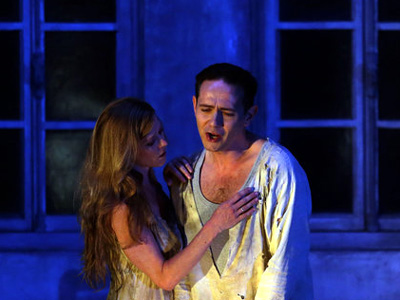by Sedgwick Clark
British composer George Benjamin’s opera Written on Skin certainly doesn’t need my praise after all the encomia it received at its world premiere at Festival d’Aix-en-Provence in July 2012 and its London premiere on March 9 at Covent Garden. But I can report on the U.S. premiere this past Monday at Tanglewood’s Festival of Contemporary Music in Ozawa Hall. In a word, it was thrilling.
The playing of the Tanglewood Music Center Fellows, a student orchestra, was flawless from top to bottom—indeed, already imbued with the elder orchestra’s Boston richness and depth of tone. Even in a concert performance, the young singers displayed a sense of drama and commitment fully competitive with the excellent Aix cast available on the recently released Nimbus CD set. They were: Lauren Snouffer (Agnès), Evan Hughes (Protector), Augustine Mercante (Angel 1/Boy), Tammy Coil (Angel 2/Marie), and Isaiah Bell (Angel 3/John). My concert companion had heard the Aix premiere and expressed misgivings about attending the Tanglewood performance, but after the first few minutes she turned to me, smiled, and nodded her assent.
The composer conducted the Aix and London performances and did so at this concert as well. On the evidence of this one concert, I have no hesitation in stating that Benjamin is a great conductor. Never for a moment was there doubt of his control over his youthful orchestra, and the precision of attack, allied with expressive warmth and natural freedom of phrase, was masterful. His biography states that he has conducted some of the world’s great ensembles, in repertoire from Schumann to Wagner and, of course, works by many of his contemporaries. I hope to hear him conduct again as soon as possible . . . as long as it doesn’t unduly compromise his composing career.
Program details of Bard Music Festival, “Stravinsky and His World”
WEEKEND TWO: Stravinsky Re-invented: From Paris to Los Angeles
Friday, August 16
SPECIAL SHOWING
Filming Stravinsky: Preserving Posterity’s Image
Weis Cinema
Free and open to the public
PROGRAM SIX
Against Interpretation and Expression: The Aesthetics of Mechanization
Sosnoff Theater
7:30 pm Pre-concert Talk: Christopher H. Gibbs
8 pm Performance: Eric Beach, percussion; Judith Gordon, piano; Jonathan Greeney, percussion; Imani Winds; Piers Lane, piano; Peter Serkin, piano; Gilles Vonsattel, piano; Bard Festival Chamber Players and students of The Bard College Conservatory, conducted by Leon Botstein
Igor Stravinsky (1882–1971)
Concerto for Piano and Winds (1923–24)
Sonata for Two Pianos (1943–44)
Béla Bartók (1881–1945)
Sonata for Two Pianos and Percussion, Sz 110 (1937)
Edgard Varèse (1883–1965)
Octandre (1923)
Paul Hindemith (1895–1963)
Kleine Kammermusik, Op. 24, No. 2 (1922)
Olivier Messiaen (1908–92)
From Quatre études de rythme (1949–50)Tickets: $25, $35, $50, $60
Saturday, August 17
PANEL THREE
Lenin, Hitler, Stalin, and Mussolini: Music, Ethics, and Politics
Olin Hall
10 am—noon
Tamara Levitz, moderator; Tomi Mäkelä; Simon Morrison; Michael Beckerman
Free and open to the public
PROGRAM SEVEN
Stravinsky in Paris
Olin Hall
1 pm Pre-concert Talk: Manuela Schwartz
1:30 pm Performance: Xak Bjerken, piano; Randolph Bowman, flute; Sara Cutler, harp; Jordan Frazier, double bass; Marka Gustavsson, viola; Robert Martin, cello; Jesse Mills, violin; Harumi Rhodes, violin; Sharon Roffman, violin; Laurie Smukler, violin; Bard Festival Chamber Players
Igor Stravinsky (1882–1971)
Les cinq doigts, for piano (1921)
Octet for Wind Instruments (1922–23)
Duo concertant (1931–32)
Albert Roussel (1869–1937)
Sérénade, for flute, harp, and string trio, Op. 30 (1925)
Bohuslav Martinu (1890–1959)
String Quartet No. 4, H. 256 (1937)
Sergey Prokofiev (1891–1953)
Sonata for Two Violins, Op. 56 (1932)
Arthur Lourié (1892–1966)
Sonata for Violin and Double Bass (1924)
Alexandre Tansman (1897–1986)
Sonatina for Flute and Piano (1925)
Tickets: $35
PROGRAM EIGHT
The Émigré in America
Sosnoff Theater
7 pm Pre-concert Talk: Leon Botstein
8 pm Performance: John Relyea, bass-baritone; Rebecca Ringle, mezzo-soprano; Bard Festival Chorale, James Bagwell, choral director; American Symphony Orchestra, conducted by Leon Botstein, music director
Igor Stravinsky (1882–1971)
Jeu de cartes (1936)
Symphony in Three Movements (1942–45)
Ode (1943)
Requiem Canticles (1965–66)
Arnold Schoenberg (1874–1951)
Kol Nidre, Op. 39 (1938)
Hanns Eisler (1898–1962), Score for Night and Fog (1955), a film by Alain Resnais
Tickets: $30, $50, $60, $75
Sunday, August 18
PROGRAM NINE
Stravinsky, Spirituality, and the Choral Tradition
Olin Hall
10 am Performance with commentary by Klára Móricz, with the Bard Festival Chorale, James Bagwell, choral director; Frank Corliss, piano; Bard Festival Chamber Players
Choral works by Igor Stravinsky (1882–1971); Gesualdo da Venosa (1566–1613), Claudio Monteverdi (1567–1643); Johann Sebastian Bach (1685-1750); Sergey Rachmaninoff (1873–1943); Francis Poulenc (1899–1963), Lili Boulanger (1893–1918), and Ernst Krenek (1900–91)
Tickets: $30
PROGRAM TEN
The Poetics of Music and After
Olin Hall
1 pm Pre-concert Talk: Richard Wilson
1:30 pm Performance: Rieko Aizawa, piano; Imani Winds; Alexandra Knoll, oboe; Piers Lane, piano; Jesse Mills, violin; Bard Festival Chamber Players
Igor Stravinsky (1882–1971)
Circus Polka, arranged for piano (1942, arr. 1944)
Septet (1952–53)
Anton Webern (1883–1945)
Variations for Piano, Op. 27 (1936)
Walter Piston (1894–1976)
Suite, for oboe and piano (1931)
Aaron Copland (1900–90)
Nonet (1960)
Elliott Carter (1908–2012)
Woodwind Quintet (1948)
Ellis Kohs (1916–2000)
Sonatina for Violin and Piano (1948)
Carlos Chávez (1899–1978)
From Ten Preludes (1937)
Tickets: $35
PROGRAM ELEVEN
The Classical Heritage
Sosnoff Theater
3:30 pm Pre-concert Talk: Tamara Levitz 4:30 pm Performance: Gordon Gietz, tenor; Jennifer Larmore, mezzo-soprano; Sean Panikkar, tenor; John Relyea, bass-baritone; Bard Festival Chorale, James Bagwell, choral director; American Symphony Orchestra, conducted by Leon Botstein, music director; and others
Igor Stravinsky (1882–1971)
Perséphone (1933–34, rev. 1948)
Oedipus Rex (1926–27, rev. 1948)Tickets: $30, $50, $60, $75All programs subject to change.
The Festival Glutton
Abandoning my contrarian avoidance of summer-music, a week of festival gluttony has left me exhausted but happily so: the first weekend of Bard’s Stravinsky deluge (8/9-11), Tanglewood Contemporary Music Festival’s U.S. premiere of George Benjamin’s ecstatically received opera Written on Skin (8/12), and back home for David Lang’s Whisper Opera at Lincoln Center’s Mostly Mozart Festival (8/13).
Ever the proselytizer, the Bard Festival’s Leon Botstein can’t resist sharing a cornucopia of music with his audiences, and those of us who share his passion are happy to follow. He and his artistic co-directors, Christopher H. Gibbs and Robert Martin, invariably concoct illuminating programs of music by the primary composer and complementary works by various colleagues. Preconcert talks and panels of experts dot the schedule, reminding us that Bard is a school. One never fails to learn and even be surprised. (Ever hear any music by Mikhail Gnesin, Maximilian Steinberg, or André Souris? I hadn’t even heard of the latter.) Two programs this year feature ten composers, and they sometimes run close to three hours due to setups between works. Bard audiences are notable for their sitzfleisch.
Botstein’s presentational approach to conducting is more in tune with Stravinsky, who claimed to loathe interpreters, than, say, Mahler, whose music is open to a variety of approaches. In a preconcert talk on opening night, Botstein said that, with few exceptions, Stravinsky’s music is no longer difficult for contemporary audiences. But, he warned ominously about one of the works on the program, “I assure you that Abraham and Isaac does sound ‘modern.’ ” (Actually, it doesn’t, being a 60-year-old serialist relic whose time has long passed in our current, neo-tonal era.) Interestingly, Botstein’s easygoing performance of this ungrateful piece with members of the American Symphony Orchestra was quite the most digestible I’ve ever heard, abetted by baritone John Hancock’s mellow rendering of the Hebrew text. The most popular work on the program, Symphony of Psalms, was unerringly paced but compromised by mushy choral articulation. Anna Polonsky and Orion Weiss, two young pianists who would shine in other performances throughout the weekend, brought the unaccountably neglected Concerto for Two Pianos to life. And Botstein led a taut Les Noces that featured a characterful vocal quartet—soprano Kiera Duffy, mezzo-soprano Melis Jaatinen, tenor Mikhail Vekua, and bass-baritone Andrey Borisenko—to end the concert.
The second program, called “The Russian Context,” was one of those point-making Bard concerts performed largely by workmanlike festival regulars. Three Tchaikovsky works, for instance, Feuillet d’album, Op. 19, No. 3, and Humoreske, Op. 10, No. 2, both for piano, and the song None but the Lonely Heart, Op. 6, No. 6, were all adapted by Stravinsky for his 1928 ballet Le Baiser de la fée. The pianist in these, and several other works throughout the first weekend, Gustav Djupsjöbacka, was discouragingly half-hearted, whether as soloist or accompanist. Fortunately, contributions by pianists Orion Weiss in works by Glinka and Stravinsky and Piers Lane in works by Rachmaninoff, Scriabin, and Stravinsky compensated. Most impressive, however, was the young, Curtis-trained Dover Quartet in Glazunov’s Five Novelettes, Op. 15, which had everyone marveling over the foursome’s warm, full-bodied sonority and gracious Romantic style.
A teacher, Rimsky-Korsakov, and two students, Steinberg and Stravinsky in works from 1913, dominated the third program, with the full American Symphony under Botstein reveling in the shimmering sensuousness of a suite from Rimsky-Korsakov’s The Legend of the Invisible City of Kitezh (1907) and Maximilian Steinberg’s ballet suite from Les métamorphoses. What a contrast with the savage Le Sacre du printemps, conducted pretty much in one well-chosen tempo throughout, as the work’s first conductor, Pierre Monteux, said was possible. There were no serious mishaps, and the Danse sacrale—the burial ground for innumerable past performances—went perfectly. Unfortunately, the brass were nearly always too loud, overwhelming the strings, and rasping and ugly besides.
Many performances of Schoenberg’s Pierrot Lunaire strike people as modern because they are so unattractively sung. What a revelation, then, to hear Kiera Duffy tackle the composer’s Sprechstimme
Tanglewood perf fully competitive with any musical performance I’ve ever heard! And, upsettingly so, what a qualitative contrast with Bard’s standard (still haven’t read your review)!! One wants to be encouraging about Bard because there are so many positive aspects of it, but the student orchestra and vocalists at Tanglewood were so vastly superior that the Bard performers–all professionals, after all, although Peter Serkin was the only “name” soloist at Bard this year–were nearly all thrown in the shade. I have no idea what the respective budgets are, but professionals must be paid, and students do not. It’s difficult when the weakest link in the festival is its leader.
Looking Forward
My week’s scheduled concerts (8:00 p.m. unless otherwise noted):
8/15 at 7:00. Rose Theatre. Mostly Mozart Festival. Budapest Festival Orchestra/Ivan Fischer. Mozart: Le Nozze di Figaro.
8/16-18 (various times). Bard Music Festival. Annandale-on-Hudson, N.Y. “Stravinsky and His World.” See schedule above.
 legal and business issues for the performing arts, visit ggartslaw.com
legal and business issues for the performing arts, visit ggartslaw.com
